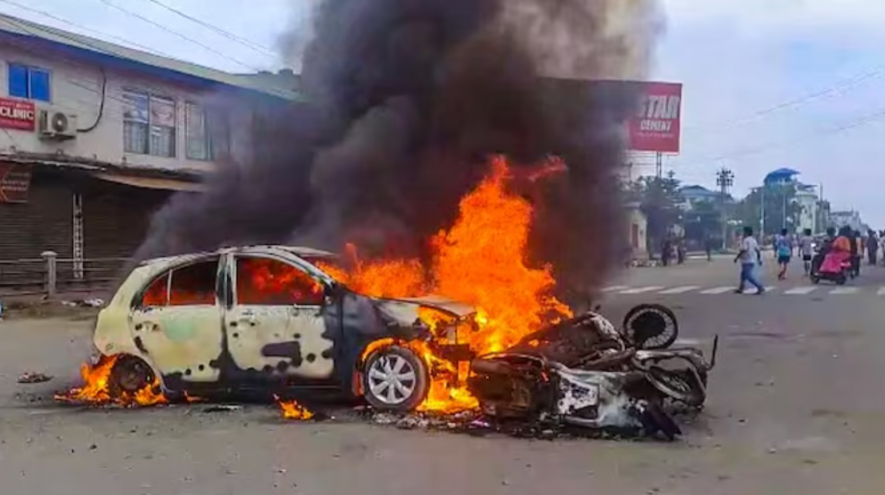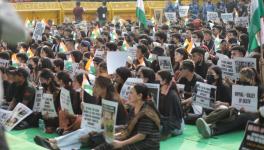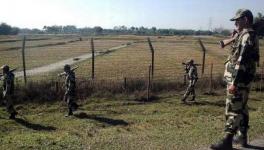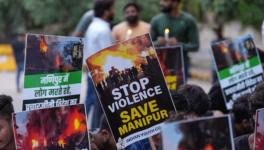Meitei and Kuki Have Suffered Enough, Peace Needs a Chance

Image credit: PTI
The many facets of a shared identity, including being democratic and peace-loving, must be used to douse the prevailing social and political tensions between the Kuki and the Meitei in Manipur.
Manipur’s inter-ethnic society is well-known for the coexistence of its colourful ‘salad bowl’ of different ethnic cultures, languages, and belief systems, complemented by its natural landscape. Beneath the beauty, however, most of Manipur’s post-merger existence has been scarred by sub-nationalisms that have turned into inter-ethnic conflicts. Given the tension and emotions on both sides today, political solutions to the ongoing Meitei-Kuki conflict seem difficult, but they are not impossible.
The bone of contention between the communities is the demand of a section of Meitei for inclusion in the Scheduled Tribe list, which the Manipur High Court directed the state government to recommend on 27 March. On 3 May, the All Tribal Student Union (ATSUM) organised a “solidarity march” against the order in hill areas. It met with violence, leading to a spurt of clashes that spread to a few districts. Over 130 deaths and 5,036 cases of arson had been reported by early July. The crisis cut off supply chains between the hills and the valley, resulting in a rise in prices of essential commodities, a health crisis, and an internet shutdown.
However, the most significant loss has been the widening trust deficit between the state and its citizens, jeopardising the political and development work essential to reduce the gap between the hills and the valley. On 17 May, the Supreme Court of India criticised the Manipur High Court’s order as “factually incorrect” and stayed it on the ground that judicial rulings cannot include or exclude communities from the list of Scheduled Tribes. The crisis has raged for over 60 days without a political solution in sight, and no effective conflict-resolution process has been initiated.
Prime Hurdle is Trust Deficit
Security conditions in conflict-ridden Manipur are volatile, as reports of gunfights and killings of civilians still come in. A democratic society cannot describe coercion and violence as strategies to resolve conflicts in which claims and counter-claims emerge from both sides. While the Kukis alleged local security forces allowed Meitei locals to take their weapons, the Meitei alleged that the Indian Army did not intervene to stop the armed individuals from targeting them. It is an example of the loss of trust in the democratic machinery.
The lack of trust is why the 51-member “peace committee” constituted on 10 June by the government of India was viewed with mistrust. It is also evident in the failure of this peace-making initiative. In particular, the Kuki leaders questioned the constitution of this committee, saying the Kukis were not consulted before being included in it. That one loophole could derail the entire peace-making exercise signals the extent of distrust between the two communities. Restraint on both sides can revive the process, provided there is predictability in the efforts and the right leaders are picked on all sides to make confidence-building succeed.
The state government should reach out to all affected communities and demonstrate impartiality to help re-establish faith in the central and state-level official machinery. For instance, relief measures such as essential food supplies and temporary homes for the internally displaced persons in the affected hill districts of Churachandpur, Kangpokpi, and Tengnoupal, and in Imphal East and Imphal West, would be essential.
Even after this, a lot would remain to be done before the displaced, whose houses have been burned down, many of whom have taken shelter in Mizoram and Assam, can return to their homes. Reports say the internally displaced number is at a staggering 50,000.
The central leadership has not helped bridge the trust gap between the two communities or improve the law and order situation. This reflects in the limited success of government efforts, although 36,000 central forces are stationed in the conflict areas.
Commentators have pointed out that even after Union Home Minister Amit Shah visited Manipur from 29 May to 1 June, the violence continued in the crisis-hit areas.
Indeed, high-profile political leaders were targeted during his visit, including the burning of the house of a Union minister and severe injuries inflicted on a Member of the Legislative Assembly. Separate delegations of Meitei and Kuki have visited Delhi recently to meet the Prime Minister in reported efforts towards peace, but those have come to no avail.
In a desperate attempt to manage the conflict, the Army has created so-called buffer zones in selected areas considered the most vulnerable to violence, such as Phaileng at the Kangpokpi and Imphal West border, where Meitei and Kuki villages are side by side. These villages now have the Army, Assam Rifles and Border Security Forces stationed around them. New security posts have been created in these zones through demarcated lines that range from a few hundred metres to even a kilometre. These lines now control the movement of people from either community. Even if this enforces peace for now, actual peacekeeping may take time.
Conflict as Chance to Re-examine
Continuous curfews and internet shutdowns are not a long-term solution to the crisis. If conflicts cause devastation and destruction, they, including the one in Manipur, provide an opportunity to re-examine policies and objectives, such as our conception and understanding of the demands for Scheduled Tribe status. It is essential to take on record the incompatibilities in perspectives between the Kuki and the Meitei, which have stoked the ongoing conflict. It has been argued that a section of the Meitei are a dwija (or twice-born) caste who practise Hinduism, while others practise Sanamahi. Therefore, any “re-conversion” to Sanamahi would entitle the community to Scheduled Caste and not Scheduled Tribe status.
On the other hand, Scheduled Tribe status is constitutionally granted to tribals based on primitiveness, remoteness and backwardness. But it cannot be ignored that the Meitei belong to the same linguistic family as the hill tribes. Further, a section of Meitei strongly believes that their ancestral lands, culture, and identity should be protected through the Scheduled Tribe status. Conversely, the tribals see the growing demand for this status threatening their situation and land.
The issue is that the state has failed to identify and predict the tensions that could erupt due to these conflicting demands. Perhaps the complex ethnic tensions and the state’s reluctance to step in go hand in hand. We know that there is no sign of withdrawal of the diametrically opposed stands on either side, making it less likely that both sides will arrive at a point of shared objectives. It would mean that the two conflicting parties must re-create a new understanding of this conflict, focusing on what must be changed and what procedures can bring about a transformation. Dialogues and discussions through democratic channels are necessary to remove mutual suspicion.
Respecting the interests of ethnic groups through policy and offering opportunities to the aggrieved parties through the political system, which can then absorb the pressure of competing groups, is essential. Policies and laws are instruments for implementing democratic accommodation. The ongoing conflict has also brought into question the effectiveness of federalism since it could not prevent an ethnic conflict over competition for political resources. The political system is, instead, stretched thin by rival aspirations.
Ethnic conflicts also provide an opportunity for social progress. In Manipur, the focus of discourse must return to eliminating the infrastructure and development gap between the hills and the valley. Urbanisation in Manipur has reportedly expanded the share of urban land from 19% in 1989 to 32% in 2020. It is also reported that urbanisation heavily concentrates in Imphal city, which reached 61% of its area in 2011. Among hill districts, Ukhrul stands out with 15% urbanisation, Chandel at 14%, Churachandpur at 7%, and Senapati at 2%.
A shared identity has many facets, including being a democratic and peace-loving society. This understanding must come to use today, to end the tensions between the communities. Recognising that strengthening democratic institutions can dispel fear, they must abjure violence, come to the negotiating table, and reignite faith in democratic institutions.
Strength of Community for Conflict Resolution
Social interests are best guaranteed by establishing social institutions, such as the Meira Paibi groups and the Kuki Mothers Association. There is a need to emphasise the close cooperation and collaboration among these groups in pre-conflict times to rekindle the hope for peace.
The Manipur Land Reforms and Land Revenue Act of 1960 prohibits non-tribals from purchasing land in the hills, while the tribals can buy and sell lands in the valley. Article 371C of the Constitution guarantees separate administrative setups for the hills and the valleys. If any attempt is made to re-engineer this social arrangement, it must address the social, economic, and cultural concerns on both sides. Indeed, the memories of their harmonious past and coexistence might be a breath of fresh air in this stale environment. Both communities have suffered tremendously and must give peace a chance. For long-term communal and ethnic harmony in Manipur, it is fundamental that Manipuris identify as a Manipuri first, irrespective of ethnicity and without prejudice towards each other.
A political solution can arrive only after all stakeholders prepare a ground conducive to negotiation and mediation. Attempts at superficial satisfaction and agreement, especially through coercion and violence, may temporarily mask this conflict’s structural and cultural dimensions—but they will not lead to sustainable peace. The latent dissatisfactions on both sides make engaging in a transformative process essential. Manipur cannot afford a protracted conflict, lest it misses out on opportunities for progress.
The author taught political science at the University of Delhi. The views are personal.
Get the latest reports & analysis with people's perspective on Protests, movements & deep analytical videos, discussions of the current affairs in your Telegram app. Subscribe to NewsClick's Telegram channel & get Real-Time updates on stories, as they get published on our website.
























